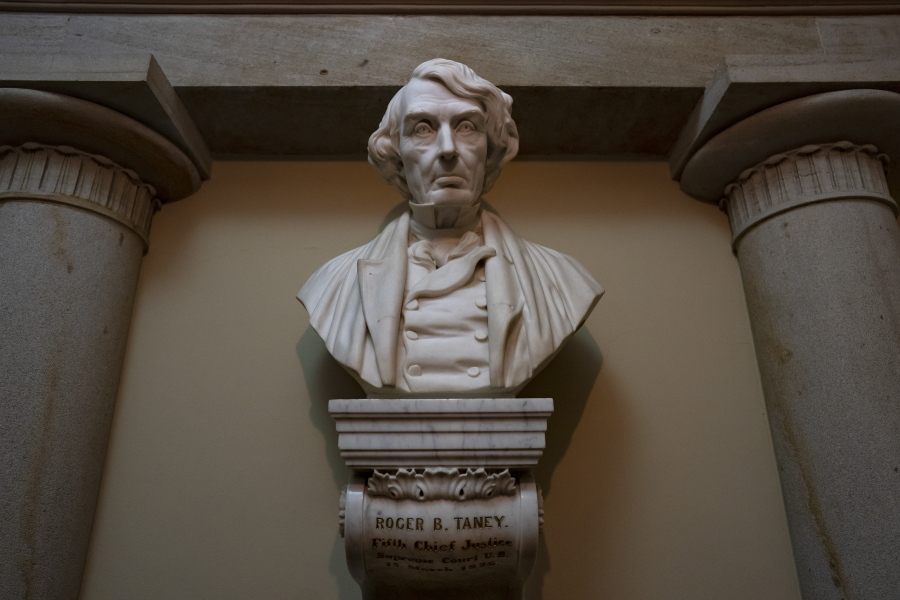WASHINGTON (AP) — The House is expected to approve a bill Tuesday that would remove from the Capitol a bust of Roger Taney, the U.S. chief justice best known for an infamous pro-slavery decision, as well as statues of Jefferson Davis and others who served in the Confederacy.
A similar bill last year failed to gain traction, but backers are hoping for a different outcome now that President Joe Biden is in the White House and Democrats control the Senate. Many Republicans in the House are expected to vote for the measure.
The vote comes against the backdrop of larger reckoning in the U.S. with racism, one that’s prompted a reassessment of statues and other symbols that valorize those who upheld white supremacy. Protesters decrying racism last year targeted Confederate monuments in multiple cities, leading to many being taken down. But many others remain in places of honor, including at the U.S. Capitol.
“We cannot achieve true equity and a sense of welcome in public spaces if we continue to honor individuals who rose to prominence upholding slavery and other examples of systemic racism,” nine environmental groups, including the Sierra Club and League of Conservation Voters, wrote in a letter to lawmakers urging them to vote for the bill.
The Taney bust would be replaced with one of Thurgood Marshall, the first Black justice to serve on the nation’s highest court. The 2-foot-high marble bust of Taney is outside a room in the Capitol where the Supreme Court met from 1810 to 1860. It was in that room that Taney, the nation’s fifth chief justice, announced the Dred Scott decision, sometimes called the worst decision in the court’s history.
The Supreme Court held that Scott as a Black man was not a citizen and therefore had no right to sue, and found that legislation restricting slavery in certain territories was unconstitutional.
Three other statues honoring white supremacists — including former U.S. Vice President John C. Calhoun of South Carolina — would also be immediately removed under the legislation. Longer-term, the architect of the Capitol would be instructed to identify any other statues depicting those who served in the Confederate States of America for removal from public display.
The statues would go back to the states that sent them. The statue of Davis, for example, would be returned to Mississippi and that of Alexander Hamilton Stephens would be returned to Georgia. Davis served as the Confederacy’s president and Stephens was its vice president.
Each state gets to submit two statues for display in the Capitol. When the donated statue arrives, it is placed in a location selected by the Joint Committee on the Library, a group of 10 lawmakers from both chambers that oversees works of fine art in the building.
Republicans note that some states are already working to replace some of about a dozen statues that would be potentially removed under the bill. North Carolina, for example, is replacing a statue of Charles Aycock, a former governor and white supremacist, with that of the Rev. Billy Graham. But the process is painfully slow.
“It’s Congress’s responsiveness to the state’s request that actually delays the process,” said Republican Rep. Rodney Davis of Illinois.
Some Democratic lawmakers offered to work with Republicans on speeding up the approval process, but they want to forge ahead in the meantime. Rep. Zoe Lofgren, the Democratic chair of the House Administration Committee, said the Confederate statues honor “traitors to their country.” She denied that removing them would be erasing the nation’s history.
“On the contrary, we must never forget our nation’s shameful periods of slavery, segregation and racism,” Lofgren said.
“Now, that history belongs in a museum. You know, we need to remember our history,” she said. “It doesn’t belong on a pedestal.”
One statue already gone from the Capitol is that of Confederate Gen. Robert E. Lee, which was removed from the National Statuary Hall Collection last year at the request of Virginia Gov. Ralph Northam. A state commission decided that Lee was not a fitting symbol for the state.
Just two weeks ago Congress approved a bill establishing Juneteenth as a new federal holiday commemorating the end of slavery in the United States, an unexpected breakthrough for supporters of the legislation. Democrats see a similar chance to address longstanding frustrations about the statues in the Capitol and are putting Republican lawmakers on the spot by calling a vote.
Last year, Sen. Mitch McConnell, R-Ky., said he supported continuing the practice of states replacing the statues on their own.
“They can trade them out at any time … a number of states are trading them out now,“ McConnell told reporters.
He also referred to the House legislation as “nonsense” that would “airbrush the Capitol.”
However, Republicans joined Democrats in the final weeks of Donald Trump’s presidency to override his veto of a defense policy bill that allows for the renaming of military bases that honor Confederate leaders. Trump repeatedly emphasized his opposition to changing the names of the military bases.



